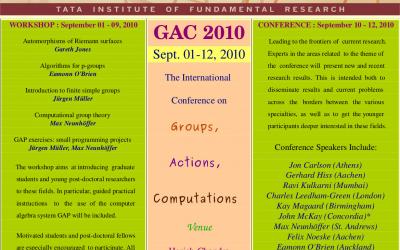This program combines a workshop and conference covering a broad range of modern and currently very active areas of the theory of finite groups, encompassing computational techniques as well as applications. In particular, general techniques for matrix and permutation groups, the classification of and computations with p-groups, an introduction to finite simple groups, and actions of finite groups on Riemann surfaces will be addressed.
The program will have two parts:
Workshop, September 01-09, 2010, consisting of some five series of four two-hour lectures each, aiming at introducing graduate students and young post-doctoral researchers to these fields. In particular, guided practical instructions to the use of the computer algebra system GAP will be included.
Conference, September 10-12, 2010, leading to the frontiers of current research. Experts in the above fields will present new and recent research results. This is intended both to disseminate results and current problems across the borders between the various specialties, as well as to get the younger participants deeper interested in these fields.
Workshop, September 01-09, 2010
- Automorphisms of Riemann surfaces [Gareth Jones]
- Riemann surfaces and their uniformisation
- Riemann surfaces of genus 0 and 1 (elliptic curves)
- The hyperbolic plane, Fuchsian groups, and Riemann surfaces of genus greater than 1
- Automorphisms of Riemann surfaces and normalisers of Fuchsian groups
- Presentations of Fuchsian groups
- Triangle groups and their quotients
- Hurwitz groups and surfaces
- Actions on homology and other modules, and related character theory
- Algorithms for p-groups [Eamonn O'Brien]
- Polycyclic presentations for finite (soluble and) p-groups and their properties
- p-quotient and other algorithms to compute such presentations for (finite) quotients of finitely-presented groups
- p-group generation algorithm to construct (up to isomorphism) p-groups
- Isomorphism testing and automorphism group computations for p-groups
- Classification of p-groups by small order, small composition length, coclass
- Databases of such groups and their use
- Introduction to finite simple groups [Jürgen Müller]
- Symmetric and alternating groups (as permutation groups)
- Lie type groups (as classical and other matrix groups)
- Sporadic groups (group theoretic, geometric or combinatorial descriptions)
- Some remarks on the proof of the classification
- Computational group theory [Max Neunhöffer]
- Permutation groups
- Matrix groups
- Matrix group recognition
- Action on huge search spaces
- Applications e.g. to algebraic combinatorics
- GAP exercises: small programming projects [Jürgen Müller, Max Neunhöffer]
- Permutation groups
- Matrix groups
- Finitely presented groups
- PC presented groups
- Character theory
Conference, September 10-12, 2010
List of speakers include:
- Jon Carlson (Athens)
- Gerhard Hiss (Aachen)
- Ravi Kulkarni (Mumbai)
- Charles Leedham-Green (London)
- Kay Magaard (Birmingham)
- Max Neunhöffer (St. Andrews)
- Felix Noeske (Aachen)
- Eamonn O'Brien (Auckland)
- I.B.S. Passi (Mohali)
- N.S.N. Sastry (Bangalore)
- Akos Seress (Columbus)
- Sergey Shpectorov (Birmingham)
- R.P. Shukla (Allahabad)
- Said Sidki (Brasilia)
- Bill Unger (Sydney)
 hri
hri res
res in
in- Talks
- Other links


